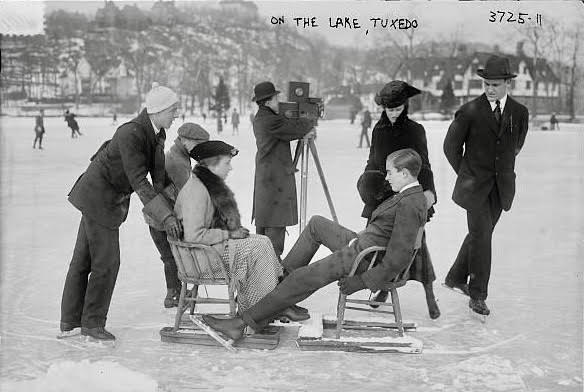|
Getting your Trinity Audio player ready...
|
Several decades ago, many of us enjoyed watching Robin Leach’s television series “Lifestyles of the Rich and Famous” and, more recently, we’ve tuned into the 1880s-era series “The Gilded Age” on HBO-Max. Who isn’t fascinated by the way the one percent live?
Coral Gables author Stuart McGregor’s latest book The Wee Wah Beach Club: An American Story of Social Change provides us with another fascinating glimpse into the history of Tuxedo Park, New York during its heyday from the late 1800s to date. It was a place where formal-wear parties were common and, in fact, is where the “tuxedo” jacket we know today came into existence. It was a place where the Lorillard, Astor, Rogers and other “great robber baron” families spent their spring and fall before heading to their mansions in Newport for summer and Palm Beach in winter.
“It is a place where Jay Gatsby of The Great Gatsby would certainly have fit “if accepted,” says McGregor.
An attorney and former Wall Street executive, McGregor grew up in Tuxedo Park and recognized at an early age the social and economic gulf between the haves and the have nots.
“My maternal and paternal grandfathers served as head gardeners of large estates lasting into the 1950s in Tuxedo Park when I was young,” he recalls. “It was a formative time for me playing in the formal gardens, greenhouses, orchards and potting sheds as my grandfather managed as many as 20 men maintaining Kincraig. The estate was owned by a man who inherited $12 million dollars – over $ 500,000,000 dollars today – from his uncle, not including real estate, in 1907.”
At the turn of the 20th century, Tuxedo Park mansions boasted exotic tropical palms growing in greenhouses, formal Italian gardens, statuary from Europe, expansive lawns and the members-only Tuxedo Club.

Although the Park inside the gates contained three lakes and an early beach abandoned by Tuxedo Club members for a pool at their club, workers’ families inside the gates and those who built and serviced the estates living in squalid conditions outside the gates literally on the other side of the tracks. Their homes were without running water or electricity in the early years and they had no access to the beach in the heat of summer. However, in 1936, they were given permission to create a beach club for their use during the summer months.
McGregor explains that his book serves a dual purpose: first to share the fascinating history of one of America’s most exclusive addresses that is a microcosm of our country and second, to highlight the fact that it appears that despite taxes, women’s right to vote, labor unions, the GI bill and development of suburbia, today it appears nothing has changed socioeconomically in more than 140 years in America.
“In 1920, only one percent of the country had 90 percent of the wealth. We’re in the same position today,” he says. “The outgrowth of this story of a small community mirrors the social changes that have taken place in America, but the book questions if we are heading back to a time when the disparity between social classes is rapidly returning and the gap between the ultra-rich and other Americans has returned today.”
After graduating from Boston College and working on Wall Street, McGregor was drafted into the Army in 1968. He returned to Wall Street and used the GI Bill to earn his Juris Doctorate at Fordham Law School in the evening. He and his wife Jean moved to Coral Gables in 1976 where they raised a family and he practiced trial law for over 20 years, later launching a sports-related company, before writing books.
McGregor and his family still own a small coachman’s house they purchased in his beloved Tuxedo Park in 1992. From July 4th to Labor Day, the couple can be found next to his late Uncle Buddy’s bench at the Wee Wah Beach Club having come full circle in his life.
Copies of the book can be ordered here: The Wee Wah Beach Club: An American Story of Social Change or purchased at Books & Books in Coral Gables.
ABOUT US:
For more Miami community news, look no further than Miami Community Newspapers. This Miami online group of newspapers covers a variety of topics about the local community and beyond. Miami’s Community Newspapers offers daily news, online resources, podcasts and other multimedia content to keep readers informed. With topics ranging from local news to community events, Miami’s Community Newspapers is the ideal source for staying up to date with the latest news and happenings in the area.
This family-owned media company publishes more than a dozen neighborhood publications, magazines, special sections on their websites, newsletters, as well as distributing them in print throughout Miami Dade County from Aventura, Sunny Isles Beach, Miami Beach, Coral Gables, Brickell, Coconut Grove, Pinecrest, South Miami, Kendall, Palmetto Bay, Cutler Bay and Homestead. Each online publication and print editions provide comprehensive coverage of local news, events, business updates, lifestyle features, and local initiatives within its respective community.
Additionally, the newspaper has exclusive Miami community podcasts, providing listeners with an in-depth look into Miami’s culture. Whether you’re looking for local Miami news, or podcasts, Miami’s Community Newspapers has you covered. For more information, be sure to check out: https://communitynewspapers.com.
If you have any questions, feel free to email Michael@communitynewspapers.com or Grant@communitynewspapers.com
#thatscommunitynews #communitynewspapers #miamidade #miamidadecounty #thatscommunity #miamicommunitynews #coralgables #palmettobay #southmiami #doral #aventura #pinecrest #kendall #broward #biscaynebay






